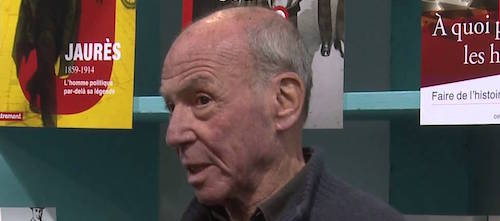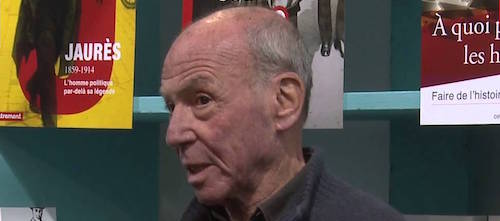"We have to destroy and to build": Eric Hazan on Nuit Debout, the Invisible Committee, La Fabrique, and Houria Bouteldja

This interview with Eric Hazan was conducted by Kévin Victoire for Le Comptoir. Translated by David Broder.
(via YouTube)
Le Comptoir: Opponents of the El Khomri bill [Labour Law] have been occupying Paris’s Place de la République for a week now [this interview was conducted on 7 April]. The movement has spread to a number of towns and cities. Is the insurrection finally coming?
Éric Hazan: I don’t think that this movement can result in anything resembling the insurrection, such as we’re thinking about. The goal seems to be that of forming a type of Podemos à la française — that is, anything but an insurrection. That said, there are a lot of different positions among the people there. But if you think an insurrection is being prepared in Place de la République, I’d have to tell you that’s not the case.
Does a spontaneous, horizontal movement have any chance of enduring, or are "vanguards" absolutely necessary?
I think that those are two different questions. Does a horizontal movement have any chance of enduring? There’s something a bit paradoxical in the idea of a "horizontal movement." Something horizontal can only wear itself down. I think that there is something antinomic in the idea of a horizontal movement progressing. But not because there is no vanguard. No one thinks vanguards are necessary any more. When Frédéric Lordon defends the idea of verticality, he is not talking about vanguards. Clearly, I respect the idea of the vanguard; I even have something of a cult of the historic vanguards. But we cannot constantly start over again doing the same thing. They proved both their greatness and their bankruptcy, since none of them succeeded in their objectives.
In La dynamique de la révolte, you note that "the philosophes and Rousseau had destroyed the foundations of the monarchy based on divine right, and established a new political climate" but also that "the [French] Revolution was not started by them." What roles can intellectuals play in a revolt? Is it La Fabrique’s ambition to play a revolutionary role, through what it publishes?
No, a publisher doesn’t have to play a revolutionary role. Rather, it should help spread ideas. When people ask us for an adjective to characterise La Fabrique, I don’t say "committed" [engagé] but "subversive." Our role is to work for the subversion of the established order, both in criticising its various aspects and in making known the different propositions that exist. We have to destroy and to build. As for the role of intellectuals, I’d ask whether "intellectual" isn’t itself a harmful notion. It implies, on the one side, those who have a certain intelligence, and on the other side those who don’t. And what are the not-intellectuals? Airheads? Dunces? People who haven’t studied? I don’t like the notion of intellectuals.
Even in the Gramscian sense, in which the intellectual is whoever has the function of spreading ideas in society?
Doubtless, this category of people does exist. But we might well doubt whether we need to attribute them a role in what’s going to happen. As with vanguards, I find this wearing. I think it belongs to the past.
In 2007 La Fabrique published [the original French edition] of the famous Invisible Committee’s The Coming Insurrection. In 2014 you re-offended with this same committee’s To Our Friends. Were you surprised by the rather considerable impact these two books had? What political impact do you think they had?
It happened in two phases. When The Coming Insurrection came out, it did well, but we weren’t overwhelmed. It came out in spring 2007, and as of November 2008, which is when the Tarnac affair broke out, we had sold 7,000 copies. But 7,000 in 18 months — we’d had that before. The fact that we’ve now sold 50,000 or 60,000 copies is thanks to this affair. To Our Friends benefited from the celebrity the Invisibile Committee acquired with The Coming Insurrection. The examining magistrate was absolutely insistent that the author of The Coming Insurrection must be Julien Coupat. I don’t know why, but his whole investigation rested on this. To Our Friends is a very good book, but it wouldn’t have had the impact it did without The Coming Insurrection.
Didn’t it also arrive in a favourable context, given the emergence of the zadistes [ZAD = Zones to Defend; zadistes are direct action squatter-occupiers] and new radicalisms?
Yes, without doubt. New phenomena were indeed being born.
In 2006 you wrote LQR: la propagande du quotidien, a book where you denounce the Orwellianisation of vocabulary and the chance of certain words’ meaning in the political and media spheres. Do words like "democracy," "republic," "modern" or "reform" still mean something today?
No, these words are elastic.
How would you explain that?
This is already ancient history. Even Blanqui said "Everyone claims to be a democrat, above all the aristocrats. Don’t you know, Monsieur Guizot is a democrat?" That was 170 years ago! And he said the same thing about "freedom."
But he defended the term "Republic," declaring "The Republic is the emancipation of the workers, it’s the end of the régime of exploitation."
He was already also criticising that word. It’s an old history.
You wrote the postface to the book Paradis infernaux, which accounts for a certain number of globalised cities that have popped up like mushrooms, and which represent the capitals of the global market. In our neoliberal, globalised context, do these new urban spaces prefigure the world to come?
That depends on us. If we let that be so, then it is entirely probable. That is to say, it is possible that intelligent, connected "smart cities" containing both the rich and their slaves will take form, surrounded by the lands abandoned to themselves. This is a nightmare we can imagine; but it’s up to us to stop it from happening.
Do you understand the polemics around the publication of Houria Bouteldja’s Les Blancs, les Juifs et nous [published by La Fabrique], which many consider — even on the radical Left, like Ensemble’s Ariane Pérez — truly characterised by racism?
Houria Bouteldja has attracted a lot of hatred against her, which explains the reaction to her book, which most either haven’t read, or did read but in bad faith. She is dignified, proud, and expresses herself very well, both speaking and in her writing. She is a woman, and added to that an Arab: too much for some. She bends the stick. She annoys everyone. And people hate her as a person more than for her ideas. Most of those who criticise this book haven’t read it. I defend it, and I take complete responsibility for it.
But doesn’t the title already create this negative assumption? And doesn’t the frequent use of the word "race" or of "shock" phrases like "I belong to my family, my clan, my race, Algeria, Islam" also play against this book?
She has long explained that the word "race" is a social construct and not a skin colour. People reading in good faith have understood that. People who say it’s racist because it uses the word "race" are idiots, or people of bad faith, or both. After all, there’s no incompatibility, there: you can be an idiot acting in bad faith.
